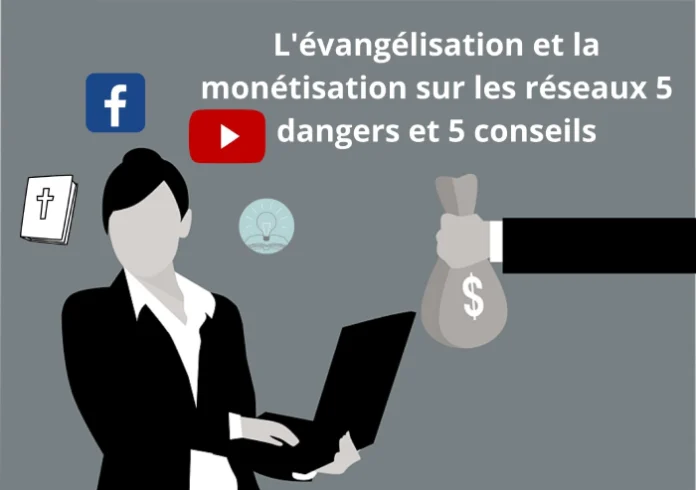Evangelism and monetization on networks 5 dangers and 5 tips
Monetization on social media and YouTube has become a source of income for many, including those in government departments evangelicals or who devote themselves to evangelization.
The Bible says in Matthew 6:24
“No one can serve two masters. Indeed, he will either hate one and love the other, or he will be faithful to one and despise the other. You cannot serve both God and money! »
This leads us to think that when it comes to associating commercial practices with religious activities, specific risks may emerge:
Commercialization of faith
There is a risk that evangelism becomes too commercial if monetization takes over the spiritual message. Worshipers and observers might see this as an attempt to take advantage of the faith, which could discredit the ministry and make the message evangelical less authentic or sincere in the public eye.
Loss of credibility and conflict of interest
If monetization is perceived as excessive or content is too focused on generating revenue rather than sharing the gospel, it could damage the credibility of the organization or individual. Followers may feel manipulated and view evangelism as more of a means of making money than a spiritual mission.
Distraction from the message
Monetization efforts, such as in-app ads, brand partnerships, or product promotions, could distract or distract from the message evangelical main. It’s important to maintain a balance so that monetized content doesn’t overwhelm or devalue spiritual content.
Financial dependence
Over-reliance on revenue generated by social media and YouTube can lead to compromise on message or values evangelicals in order to stay in line with monetization policies, trends, or the demands of a broader and not specifically Christian audience.
Ethical issues
Some may question the ethics of monetizing religious content, especially if donors believe their contributions go directly to supporting the ministry and not generating personal profit.
Tips and recommendations
To navigate these waters, ministries and individuals evangelicals who monetize their content on social networks and YouTube should consider the following tips:
1. Be transparent about how funds are generated and used.
2. Make sure monetization doesn’t compromise the integrity of the message evangelical.
3. Ensure that paid content remains true to Christian principles and ethics.
4. Avoid monetization practices becoming a barrier to accessing the message evangelical.
5. Establish clear policies to separate fundraising activities from departmental activities.
The priority
Ultimately, the goal for evangelists and Christian ministries should always be to prioritize sharing the faith and building up the body of Christ, while using monetization tools wisely and according to their principles. fundamental.
Controversy: The words of Pastor Malory Laurent revolt evangelical artists



